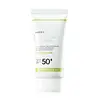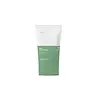What's inside
What's inside
 Key Ingredients
Key Ingredients

 Benefits
Benefits

 Concerns
Concerns

No concerns
 Ingredients Side-by-side
Ingredients Side-by-side

Water
Skin ConditioningEthylhexyl Methoxycinnamate
UV AbsorberBis-Ethylhexyloxyphenol Methoxyphenyl Triazine
Skin ConditioningParaffinum Liquidum
EmollientC12-15 Alkyl Benzoate
AntimicrobialEthylhexyl Salicylate
UV AbsorberGlycerin
HumectantDipropylene Glycol
HumectantTitanium Dioxide
Cosmetic ColorantNiacinamide
SmoothingCyclopentasiloxane
EmollientCyclohexasiloxane
EmollientDimethicone
EmollientGlyceryl Stearate Lactate
EmollientPEG-100 Stearate
Cetyl Alcohol
EmollientGlyceryl Stearate
EmollientAlumina
AbrasiveAluminum Stearate
Cosmetic ColorantPolyhydroxystearic Acid
EmulsifyingPhenoxyethanol
PreservativeStearyl Alcohol
EmollientCarbomer
Emulsion StabilisingTriethanolamine
BufferingAllantoin
Skin ConditioningHouttuynia Cordata Extract
Skin ConditioningMyristyl Alcohol
EmollientMethyl Methacrylate Crosspolymer
Mica
Cosmetic ColorantCI 77492
Cosmetic ColorantGlycyrrhiza Glabra Root Extract
BleachingChamomilla Recutita Flower Extract
MaskingHibiscus Sabdariffa Flower Extract
Skin ConditioningPearl Extract
AntioxidantButylene Glycol
Humectant1,2-Hexanediol
Skin ConditioningSodium Hyaluronate
HumectantAdenosine
Skin ConditioningParfum
MaskingDisodium EDTA
Water, Ethylhexyl Methoxycinnamate, Bis-Ethylhexyloxyphenol Methoxyphenyl Triazine, Paraffinum Liquidum, C12-15 Alkyl Benzoate, Ethylhexyl Salicylate, Glycerin, Dipropylene Glycol, Titanium Dioxide, Niacinamide, Cyclopentasiloxane, Cyclohexasiloxane, Dimethicone, Glyceryl Stearate Lactate, PEG-100 Stearate, Cetyl Alcohol, Glyceryl Stearate, Alumina, Aluminum Stearate, Polyhydroxystearic Acid, Phenoxyethanol, Stearyl Alcohol, Carbomer, Triethanolamine, Allantoin, Houttuynia Cordata Extract, Myristyl Alcohol, Methyl Methacrylate Crosspolymer, Mica, CI 77492, Glycyrrhiza Glabra Root Extract, Chamomilla Recutita Flower Extract, Hibiscus Sabdariffa Flower Extract, Pearl Extract, Butylene Glycol, 1,2-Hexanediol, Sodium Hyaluronate, Adenosine, Parfum, Disodium EDTA
Water
Skin ConditioningZinc Oxide
Cosmetic ColorantCyclohexasiloxane
EmollientButyloctyl Salicylate
Skin ConditioningPropanediol
SolventPropylheptyl Caprylate
EmollientIsododecane
EmollientPolyglyceryl-3 Polydimethylsiloxyethyl Dimethicone
Skin ConditioningCaprylyl Methicone
Skin ConditioningDicaprylyl Carbonate
EmollientMethyl Methacrylate Crosspolymer
Polymethylsilsesquioxane
Centella Asiatica Extract
CleansingArtemisia Capillaris Extract
Houttuynia Cordata Extract
Skin ConditioningMelaleuca Alternifolia Leaf Extract
PerfumingSodium Hyaluronate
HumectantDisteardimonium Hectorite
StabilisingMagnesium Sulfate
Triethoxycaprylylsilane
1,2-Hexanediol
Skin ConditioningPolyglyceryl-2 Dipolyhydroxystearate
Skin ConditioningLauryl Polyglyceryl-3 Polydimethylsiloxyethyl Dimethicone
Skin ConditioningPhenyl Trimethicone
Skin ConditioningAcrylates/Dimethicone Copolymer
Skin ConditioningGlyceryl Caprylate
EmollientCaprylyl Glycol
EmollientEthylhexylglycerin
Skin ConditioningTocopherol
AntioxidantButylene Glycol
HumectantPentylene Glycol
Skin ConditioningWater, Zinc Oxide, Cyclohexasiloxane, Butyloctyl Salicylate, Propanediol, Propylheptyl Caprylate, Isododecane, Polyglyceryl-3 Polydimethylsiloxyethyl Dimethicone, Caprylyl Methicone, Dicaprylyl Carbonate, Methyl Methacrylate Crosspolymer, Polymethylsilsesquioxane, Centella Asiatica Extract, Artemisia Capillaris Extract, Houttuynia Cordata Extract, Melaleuca Alternifolia Leaf Extract, Sodium Hyaluronate, Disteardimonium Hectorite, Magnesium Sulfate, Triethoxycaprylylsilane, 1,2-Hexanediol, Polyglyceryl-2 Dipolyhydroxystearate, Lauryl Polyglyceryl-3 Polydimethylsiloxyethyl Dimethicone, Phenyl Trimethicone, Acrylates/Dimethicone Copolymer, Glyceryl Caprylate, Caprylyl Glycol, Ethylhexylglycerin, Tocopherol, Butylene Glycol, Pentylene Glycol
 Reviews
Reviews

Ingredients Explained
These ingredients are found in both products.
Ingredients higher up in an ingredient list are typically present in a larger amount.
1,2-Hexanediol is a synthetic liquid and another multi-functional powerhouse.
It is a:
- Humectant, drawing moisture into the skin
- Emollient, helping to soften skin
- Solvent, dispersing and stabilizing formulas
- Preservative booster, enhancing the antimicrobial activity of other preservatives
Butylene Glycol (or BG) is used within cosmetic products for a few different reasons:
Overall, Butylene Glycol is a safe and well-rounded ingredient that works well with other ingredients.
Though this ingredient works well with most skin types, some people with sensitive skin may experience a reaction such as allergic rashes, closed comedones, or itchiness.
Learn more about Butylene GlycolCyclohexasiloxane is a type of silicone more commonly known as D6. It is an emollient and solvent.
Cyclohexasiloxane is used to evenly distribute ingredients throughout the product. When applied to the skin, Cyclohexasiloxane evaporates and leaves behind a silky feel.
As an emollient, it can help the skin feel soft and hydrated. It is also used to reduce frizz in hair products.
Learn more about CyclohexasiloxaneHouttuynia Cordata Extract is more commonly known as Heart Leaf, Fish Mint, or Chameleon plant.
The components found in Heart Leaf give it antioxidant, hydrating, antimicrobial, and anti-inflammatory properties.
Heart Leaf is rich in flavonoids such as quercetin, apigenin, and more. It also contains polysaccharides, the most common type of carbs in food.
Flavonoids have been shown to be effective antioxidants. They help neutralize free-radical molecules. Free-radical molecules are unstable molecules that may damage our skin cells and DNA. The flavonoids in Heart Leaf also help soothe the skin.
Polysaccharides are naturally found in our skin. They play a role in hydrating and repairing the top layer of skin. The polysaccharides in Heart Leaf help moisturize our skin.
Studies show decanoyl acetaldehyde, a component of Heart Leaf oil, is effective at killing bacteria.
The name 'Fish Mint' comes from the herb's natural fishy smell. Is is native to southeast Asia and used throughout the continent for traditional cooking and medicine.
Learn more about Houttuynia Cordata ExtractThis ingredient comes as a powder made up of small, porous, microbeads. It is used to add a silky feel to products and also helps absorb oil.
Sodium Hyaluronate is hyaluronic acid's salt form. It is commonly derived from the sodium salt of hyaluronic acid.
Like hyaluronic acid, it is great at holding water and acts as a humectant. This makes it a great skin hydrating ingredient.
Sodium Hyaluronate is naturally occurring in our bodies and is mostly found in eye fluid and joints.
These are some other common types of Hyaluronic Acid:
Learn more about Sodium HyaluronateWater. It's the most common cosmetic ingredient of all. You'll usually see it at the top of ingredient lists, meaning that it makes up the largest part of the product.
So why is it so popular? Water most often acts as a solvent - this means that it helps dissolve other ingredients into the formulation.
You'll also recognize water as that liquid we all need to stay alive. If you see this, drink a glass of water. Stay hydrated!
Learn more about Water